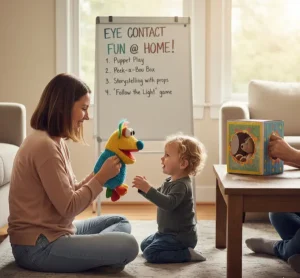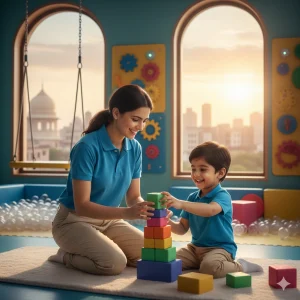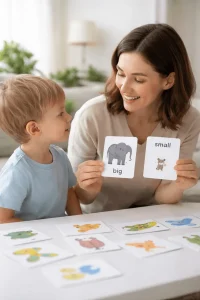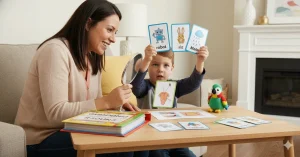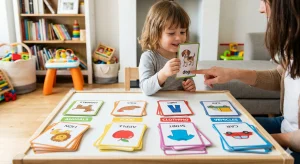OT for 9-Month-Olds: Sitting, Reaching & Sensory Skills
By Wellness Hub
Last Updated: October 18, 2025
“My baby still wobbles when sitting at 9 months — should I worry?” If this question has crossed your mind, you’re not alone. Many parents wonder what’s “normal” when it comes to sitting, reaching, and early movement skills. At around 9 months, babies are building the strength and coordination they need to sit independently, explore their world, and develop sensory awareness.
That’s where occupational therapy for 9-month-olds can make a real difference. OT focuses on supporting your baby’s motor milestones through playful, hands-on activities that strengthen posture, balance, and sensory skills.
In this guide, we’ll walk you through why sitting matters at 9 months, practical OT-based activities you can try at home, red flags to watch for, and expert-backed strategies to help your little one gain confidence and independence—one wobble at a time.
What Is Occupational Therapy for 9-Month-Olds?
Occupational therapy for 9-month-olds focuses on building sitting balance, strengthening core muscles, improving reaching skills, and supporting early sensory development through purposeful play. At this stage, babies are learning to explore their environment, and OT helps them gain the strength, coordination, and body awareness they need to sit upright, grasp toys, and respond to different textures and sensations.
By guiding natural movement and sensory experiences, occupational therapy lays the foundation for future motor milestones like crawling, standing, and walking—turning everyday play into powerful early development.
Key Developmental Goals at 9 Months
At around 9 months, your baby is growing stronger, more curious, and eager to explore their world. This stage is full of exciting milestones that build the foundation for future movement, play, and learning. Understanding these key developmental goals helps parents know what to encourage — and when to seek support if needed.
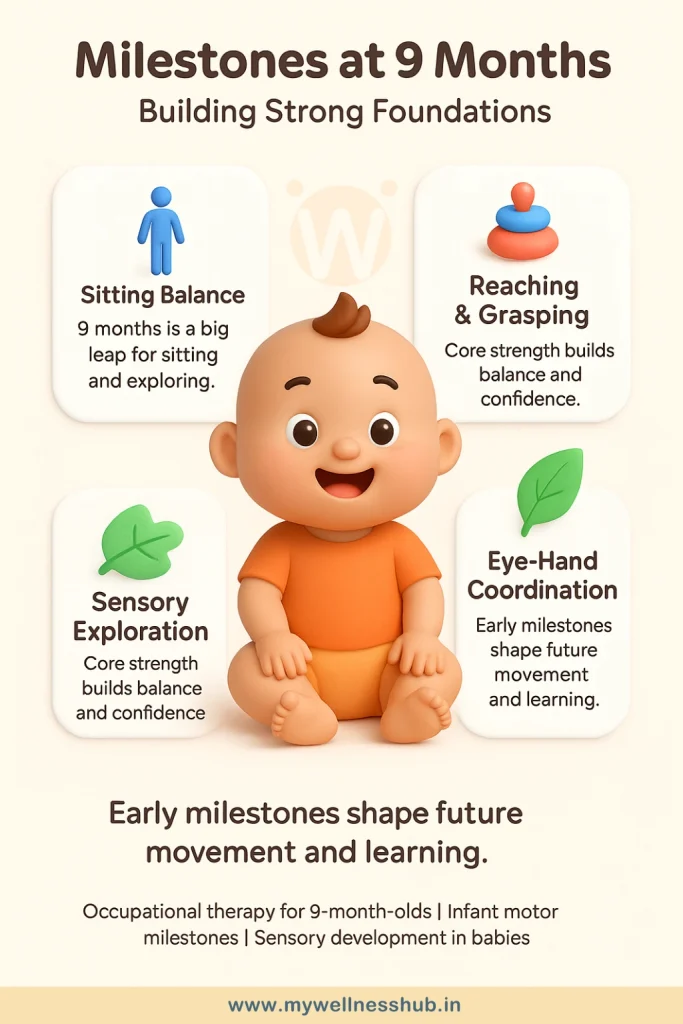
Here are the major developmental areas occupational therapy supports at this age:
- Sitting unsupported and trunk control: By 9 months, many babies are able to sit without support for longer periods. This milestone strengthens their core and improves posture, giving them the stability they need to explore their surroundings safely.
- Reaching and grasping toys: As your baby’s fine motor skills develop, they become better at reaching for, holding, and exploring objects. This improves hand-eye coordination and prepares them for self-feeding and play.
- Beginning sensory exploration: Babies at this age love to touch, squeeze, bang, and mouth objects. These sensory experiences help their brain make important connections about texture, shape, weight, and sound.
- Visual-motor coordination foundations: Tracking a moving toy, passing objects between hands, or reaching for something just out of reach builds strong visual-motor connections—skills that later support crawling, walking, and early problem-solving.
Why it matters: These milestones are not just “cute moments.” They are essential building blocks for balance, movement, focus, and independence. Occupational therapy can gently guide and support these skills when babies need an extra boost.
Also read: W-Sitting in Kids: Should Parents Be Concerned?
How Can Occupational Therapy Help My 9-Month-Old Sit Better?
Occupational therapy helps a 9-month-old sit better by strengthening core muscles, improving balance, and encouraging purposeful movement through playful, hands-on activities. These activities build postural control and confidence, making it easier for your baby to sit upright, reach for toys, and explore their surroundings safely and independently.
Here are some effective OT-based activities that support sitting skills:
- Supported sitting on caregiver’s lap – Provides gentle trunk support while letting your baby practice balancing on their own.
- Toy reaching exercises – Encourages your baby to lean, stretch, and stabilize their core while reaching for favorite toys.
- Core strengthening through gentle rocking – Rocking side-to-side helps build trunk strength and balance responses.
- Sensory ball play – Sitting on or rolling over a soft therapy ball engages core muscles and improves body awareness.
- Mirror play to promote balance – Babies love their reflection! Reaching and moving while looking in a mirror encourages active sitting.
- Tummy-to-sit transitions – Practicing controlled movements from tummy time to sitting builds stability and independence.
- Supported floor play – Using cushions or rolled towels gives extra support while babies build strength at their own pace.
Pro Tip: Consistency is key. Repeating short, daily play-based exercises strengthens your baby’s core muscles and boosts confidence in sitting without support.
Read more: Early Intervention & OT for 3-Month-Old Sensory Growth
When to See an Occupational Therapist
You may want to consult an occupational therapist if your 9-month-old is struggling to reach key movement and sensory milestones. Early support can make a meaningful difference in your baby’s growth and independence. Trust your instincts — if something feels “off,” it’s always okay to ask for professional guidance.
Here are a few red flags to watch for at this age:
- Baby cannot sit even with support or struggles to maintain an upright position for more than a few seconds.
- Limited reaching or grasping skills, such as not picking up toys or showing little interest in objects around them.
- Persistent sensory aversions, like frequent startle responses to touch, sounds, or textures.
- Very low activity levels or lack of curiosity in exploring their environment.
Expert reassurance: These signs don’t always mean something is wrong — but early intervention can give your child the extra support they need to thrive. An occupational therapist can gently assess your baby’s motor and sensory skills and design playful, developmentally appropriate activities to help them progress confidently.
Next steps: Talk to your pediatrician or book an early developmental screening with a licensed occupational therapist. The earlier you support these skills, the stronger your child’s foundation for future milestones like crawling, standing, and walking.
Sensory Play Activities You Can Try at Home
Sensory play is a powerful way to help your 9-month-old strengthen their core, improve balance, and build body awareness—all through fun, playful experiences. These simple activities stimulate your baby’s senses of touch, sight, movement, and sound, laying the foundation for better sitting balance, motor skills, and early learning. The best part? You can do most of these right at home with little to no special equipment.
Here are some easy and effective sensory play ideas:
- Tummy-time games
Encourage your baby to spend short bursts of time on their tummy, reaching for toys or looking in a mirror. Tummy time builds upper body strength, improves head control, and supports the transition to sitting. - High-contrast toys
Black-and-white or brightly colored toys grab your baby’s attention and help develop visual tracking skills. Holding the toy slightly out of reach encourages your baby to stretch, reach, and shift their weight. - Textured mats
Let your baby explore different textures under their hands and feet—soft, bumpy, smooth, or crinkly surfaces. This builds sensory tolerance and improves body awareness, making sitting more stable and confident. - Gentle swaying or bouncing
Holding your baby securely while gently swaying, bouncing, or rocking helps them experience movement and develop balance responses. This kind of vestibular play strengthens trunk control in a fun and calming way. - Water play
Supervised water play in a shallow basin or with a few floating toys engages multiple senses. Splashing, reaching, and feeling water textures enhances coordination and sensory exploration. - Sensory ball or cushion play
Sitting or rolling gently on a therapy ball or firm cushion helps your baby activate their core muscles while getting used to small balance shifts. This builds both strength and confidence.
Why it matters: Sensory play isn’t just fun — it helps your baby’s brain and body work together. Activities like these support the development of trunk strength, balance reactions, and early motor planning skills.
Pro Tip: Keep each play session short (3–5 minutes) and follow your baby’s cues. A calm, engaged baby learns best through gentle, joyful movement.
Expert Insights: Building Postural Control
Strong postural control is the foundation for your baby’s ability to sit, move, and explore the world with confidence. At 9 months, your child is learning to use their core muscles to stay upright, stabilize their body, and coordinate their movements. These skills develop best when therapy and playful daily activities work hand in hand.
“Postural control is built through consistent opportunities for movement and exploration. Babies need time on the floor, gentle challenges to their balance, and hands-on support from caregivers to strengthen their trunk muscles,” explains pediatric occupational therapy specialists.
According to the Centers for Disease Control and Prevention, postural and motor milestones around 9 months—such as sitting steadily without support and reaching for toys—are essential stepping stones for crawling, standing, and walking. When babies practice these skills during therapy and at home, their strength and coordination improve naturally.
Here are a few practical ways to support postural control at home:
- Create daily opportunities for floor play in different positions (tummy, sitting, supported kneeling).
- Offer toys at varying heights and angles to gently challenge balance.
- Use soft cushions, therapy balls, or rolled towels to add playful movement.
- Pair therapy strategies with simple, fun sensory games.
Why this matters: Building postural control early helps your baby develop stability, balance, and confidence—key foundations for future milestones like crawling, pulling up, and walking. A combination of guided therapy and everyday play can make these skills come together more smoothly and naturally.
Pro Tip: Every baby develops at their own pace. Early support isn’t about pushing milestones—it’s about giving your child the right tools and environment to thrive.
Conclusion
Every baby grows at their own pace, but early support can help them reach milestones with more ease and confidence. If your 9-month-old is still working on sitting or exploring their surroundings, occupational therapy can gently build strength, balance, and sensory skills through play. You don’t have to wait for problems to act — early support is about helping your baby thrive. Simple sensory play at home or guidance from a certified occupational therapist can make a big difference. Act early, stay positive, and watch your little one grow stronger every day. Empowerment starts with small steps.
Frequently Asked Questions:
1. How can occupational therapy help my baby sit without support?
Occupational therapy helps babies build strength in their core and trunk muscles so they can sit more steadily. Through fun activities like supported sitting, reaching for toys, and gentle balance play, your baby learns to control their body and stay upright with more confidence.
2. What activities build balance at 9 months?
Simple play activities like mirror play, tummy time, toy reaching, sensory ball play, and gentle rocking help babies build balance at 9 months. These movements strengthen trunk muscles and teach your baby how to shift weight safely as they explore their surroundings.
3. When should I be concerned about sitting delays?
If your 9-month-old cannot sit even with support, shows weak trunk strength, avoids reaching for toys, or seems overly sensitive to touch or movement, it may be time to consult an occupational therapist. Early support can help babies gain skills and confidence at their own pace.
4. What are good sensory play ideas for 9-month-old babies?
Try simple sensory play like tummy-time games, textured mats, high-contrast toys, gentle swaying, or water play. These activities build strength, balance, and body awareness while keeping your baby engaged and happy. Always follow your baby’s cues during playtime.
5. How often should a 9-month-old do occupational therapy?
The frequency depends on your baby’s needs, but many children benefit from short, frequent therapy sessions and daily sensory play at home. A certified occupational therapist can guide you on what’s best for your baby’s development.
6. Can I support my baby’s motor skills at home?
Yes! Simple daily routines can make a big impact. Encourage your baby to sit, reach, and explore textures during playtime. Pairing home activities with expert guidance can speed up progress and build strong motor skills.
7. Are sitting delays at 9 months a sign of something serious?
Not always. Some babies just need extra time or support. But if delays persist, it’s best to get an early evaluation from an occupational therapist or pediatrician. Early help can make milestones easier to reach.
8. What sensory milestones should my 9-month-old reach?
By 9 months, babies usually explore textures, respond to movement, track toys visually, and reach out for objects. If your baby avoids sensory input or seems uninterested, gentle sensory play and OT support can help.
9. Does early OT really make a difference?
Yes. Early intervention helps babies build motor skills, balance, and confidence before delays become bigger challenges. Occupational therapy at this age focuses on playful, simple exercises that fit naturally into daily routines.
10. Where can I find occupational therapy support for my baby?
You can talk to your pediatrician for a referral or find a certified pediatric occupational therapist near you. Many therapy centers also offer parent-guided programs and online support to help your baby thrive at home and in therapy.
About Author:
Sonali Sharma, Occupational Therapist
Sonali Sharma is a skilled Occupational Therapist at Wellness Hub, with over three years of experience in supporting children with developmental, behavioral, and learning challenges. She holds a Bachelor’s in Occupational Therapy (BOT) from Amity University and has worked with leading institutions such as NIMHANS Bengaluru and ESIC Hospital Faridabad.
At Wellness Hub, Sonali provides online occupational therapy sessions tailored to each child’s needs. She specializes in pediatric therapy, autism support, sensory integration, and developmental skill-building, helping children strengthen motor skills, improve focus, and become more independent in daily life.
Her therapy style is child-centered, play-based, and evidence-driven—making sessions both effective and enjoyable for kids. Sonali also equips parents with practical home therapy strategies to extend progress beyond sessions.
Passionate about empowering families, Sonali believes in creating a nurturing space where children can thrive while parents feel supported every step of the way.
Book your Free Consultation Today
Parent/Caregiver Info:
Client’s Details:
* Error Message


